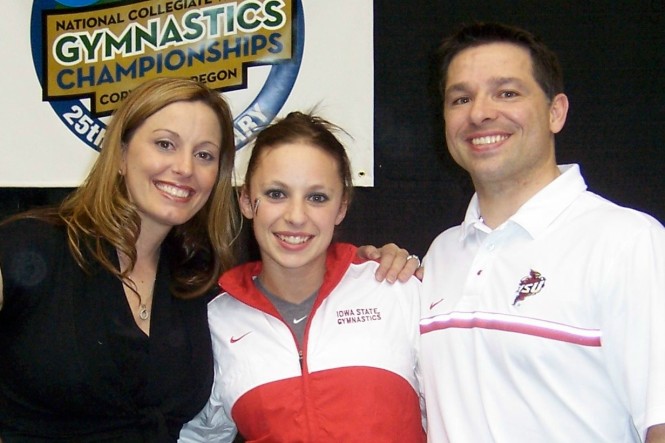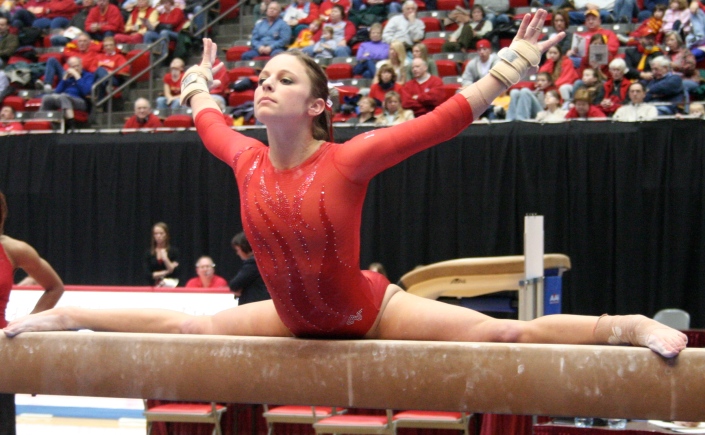The Rio 2016 Olympics are coming, if you haven’t noticed. Everyone who has ever been an athlete or enjoyed athletics in any way is pulling out their USA gear and dreaming of olympic glory. And in the midst of all the hustle and excitement, we are usually presented with numerous background stories on athletes across the country. We find out where they grew up, how they got into the sport, and you see the determination in their eyes to bring home a gold medal and realize their dreams.
One of the most popular sports in America every olympic year is gymnastics. Young and old are fascinated by the handful of young men and women who can defy gravity with their bodies and, after a series of flips and twists, land on their feet (not toe-loops, that is figure skating). The sport is mesmerizing, the stars of the sport are dedicated, and the world is watching their every move. However, though gymnastics is one of the most glorified sports, it is also one of the most criticized. Critics, spectators, and even athletes themselves question the lifestyle, coaching, and health of these high level athletes all the time. As a gymnast for nearly 2 decades and as one who competed at an elite level (although not on a world stage) I thought it would be an appropriate time to offer a little bit of real life insight into the world of an elite gymnast.
- When Did They Start
The sport of gymnastics is unlike most other sports. In women’s gymnastics, you typically peak between the ages of 14-18 (in men’s gymnastics it is closer to their mid 20’s).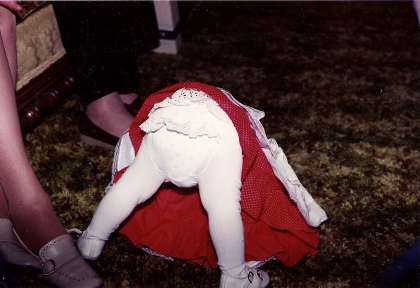 This means that you can’t really start gymnastics once you are 8 or 10 and expect to compete at a high level (although there are a few who have). Most gymnasts you see on TV have been doing gymnastics since the age of 3 or 4. By the time they are entering middle school, which is when most kids start to become involved in a sport, these athletes are more like seasoned veterans. They likely have years of competition under their belts and are training upwards of 25-30 hours/week.
This means that you can’t really start gymnastics once you are 8 or 10 and expect to compete at a high level (although there are a few who have). Most gymnasts you see on TV have been doing gymnastics since the age of 3 or 4. By the time they are entering middle school, which is when most kids start to become involved in a sport, these athletes are more like seasoned veterans. They likely have years of competition under their belts and are training upwards of 25-30 hours/week. 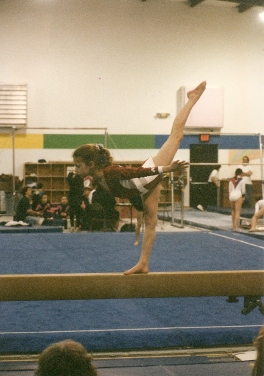 By the end of middle school, if they intend to compete at an elite level, they are usually training at 30+ hours. They have decidedly given up school dances, football games, and weekend parties for the sake of their dream, a decision they don’t regret for one second. Also, they have won the presidential award in P.E. every year since 2nd grade and can do more pull ups than any boy in the school. 😉 I, personally, started traveling to training camps and competitions with my coaches and without my parents when I was 9 years old. Some may think that is crazy, but it was a necessary step in order to achieve my goals (especially since my parents had my younger siblings to care for).
By the end of middle school, if they intend to compete at an elite level, they are usually training at 30+ hours. They have decidedly given up school dances, football games, and weekend parties for the sake of their dream, a decision they don’t regret for one second. Also, they have won the presidential award in P.E. every year since 2nd grade and can do more pull ups than any boy in the school. 😉 I, personally, started traveling to training camps and competitions with my coaches and without my parents when I was 9 years old. Some may think that is crazy, but it was a necessary step in order to achieve my goals (especially since my parents had my younger siblings to care for). - Daily Life
The day to day life of an elite gymnast revolves completely around the gym. You typically workout 6-7 hours a day with 1 day off each week. This means that school is fit in around that schedule. For some, they homeschool in order to to have more time in the gym. For me, I took summer classes every year in order to free up my mornings so I could practice. I would wake up and spend 2-3 hours with my coach training in the gym. My coaches would then drop me off at school in the late morning and I would spend the rest of the school day in class. After school, it was home for homework and some food, and then back to the gym for another 4 hours. I would get back home around 9:30, eat the dinner my mom had kept warm in the oven for me, then head to bed. There aren’t really any parties, dances, or other sports involved, but we don’t mind. Most high level gymnasts love what they do. They would rather pursue their dream, especially because the window of time in which their dream is achievable is so small. I’ve heard some argue that this extreme focus on athletics takes away from their education, but I disagree. An athlete at this level has an intense amount of dedication, an ability to focus when they need to, and an affinity for efficiency. For me, and the others that I knew at my level, we were quite successful in school even without spending as many hours in the classroom.
This means that school is fit in around that schedule. For some, they homeschool in order to to have more time in the gym. For me, I took summer classes every year in order to free up my mornings so I could practice. I would wake up and spend 2-3 hours with my coach training in the gym. My coaches would then drop me off at school in the late morning and I would spend the rest of the school day in class. After school, it was home for homework and some food, and then back to the gym for another 4 hours. I would get back home around 9:30, eat the dinner my mom had kept warm in the oven for me, then head to bed. There aren’t really any parties, dances, or other sports involved, but we don’t mind. Most high level gymnasts love what they do. They would rather pursue their dream, especially because the window of time in which their dream is achievable is so small. I’ve heard some argue that this extreme focus on athletics takes away from their education, but I disagree. An athlete at this level has an intense amount of dedication, an ability to focus when they need to, and an affinity for efficiency. For me, and the others that I knew at my level, we were quite successful in school even without spending as many hours in the classroom.  I worked hard on my school work while I was at school so that I could be finished and have more down time at home. I was on the honor roll in high school and even managed a few 4.0 semesters. The same was true for the other athletes I interacted with. Sure, we had our academic strengths and weaknesses, but overall we wanted to excel in everything we did, not just athletics.
I worked hard on my school work while I was at school so that I could be finished and have more down time at home. I was on the honor roll in high school and even managed a few 4.0 semesters. The same was true for the other athletes I interacted with. Sure, we had our academic strengths and weaknesses, but overall we wanted to excel in everything we did, not just athletics. - Nutrition
One question I am often asked is, “are/were you on a diet?” The simple answer is, no. I was given nutrition information at the various training camps I went to, but nobody controlled my food intake or told me what I could or couldn’t eat. However, knowing my goals and the importance of fueling my body, I made conscious healthy decisions from a young age.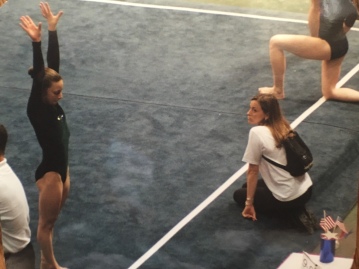 By the age of 10 or 11 I was aware that if I ate a bunch of junk food, I performed poorly the next day. I was also aware that if I ate protein the night before a competition, I pretty much kicked butt. When you are training at such an intense level, you become acutely aware of your body and how it works. I could tell you based on what I ate exactly how I would feel the next day. I could tell if the pain in my ankle was something I had to live with and tape up, or something that needed an x-ray. In America, in most cases, nobody is “forcing” you to do anything in the sport of gymnastics. You could quit at any time. That being said, if you want to be the best, you begin to learn and understand exactly what you have to do to reach your goal. I can probably count on 1 hand the number of sodas I’ve drank since the age of 10. Not because they told me not to drink soda, but because I was willing to sacrifice a can of Root Beer for the sake of success.
By the age of 10 or 11 I was aware that if I ate a bunch of junk food, I performed poorly the next day. I was also aware that if I ate protein the night before a competition, I pretty much kicked butt. When you are training at such an intense level, you become acutely aware of your body and how it works. I could tell you based on what I ate exactly how I would feel the next day. I could tell if the pain in my ankle was something I had to live with and tape up, or something that needed an x-ray. In America, in most cases, nobody is “forcing” you to do anything in the sport of gymnastics. You could quit at any time. That being said, if you want to be the best, you begin to learn and understand exactly what you have to do to reach your goal. I can probably count on 1 hand the number of sodas I’ve drank since the age of 10. Not because they told me not to drink soda, but because I was willing to sacrifice a can of Root Beer for the sake of success. - Weight Loss and Body Image
One of the more controversial topics in the sport of gymnastics is the whole body image/weight control topic. The problem is, it is a double edged sword. You can’t do gymnastics safely if you have excess weight. Every joint, bone, ligament, and muscle is put under intense pressure and repetitive pounding for years and years. Any amount of added or unnecessary weight only adds to the given dangers of the sport. If you want to be successful, you have take care of your body. Any gymnast who is eating generally healthy and training the 30 hour weeks will have absolutely no problems with being “overweight.” That being said, there are coaches out there who will pressure athletes in a negative way about their bodies. They will use weight or humiliation about the state of their body to try to “motivate” them to work harder or make a change. I, personally, NEVER experienced this.
Every joint, bone, ligament, and muscle is put under intense pressure and repetitive pounding for years and years. Any amount of added or unnecessary weight only adds to the given dangers of the sport. If you want to be successful, you have take care of your body. Any gymnast who is eating generally healthy and training the 30 hour weeks will have absolutely no problems with being “overweight.” That being said, there are coaches out there who will pressure athletes in a negative way about their bodies. They will use weight or humiliation about the state of their body to try to “motivate” them to work harder or make a change. I, personally, NEVER experienced this.  My coaches loved me as a person and always put my health and safety (mental and physical) before my athletics. There was only one time in my 18 years when the topic of weight was addressed with me, but it was in a private conversation between myself and my coaches, and it had more to do with my overall health and not just my weight. I was not abused or humiliated. No matter what the sport, no athlete should have to endure negative body image from coaches, but it happens everywhere including gymnastics.
My coaches loved me as a person and always put my health and safety (mental and physical) before my athletics. There was only one time in my 18 years when the topic of weight was addressed with me, but it was in a private conversation between myself and my coaches, and it had more to do with my overall health and not just my weight. I was not abused or humiliated. No matter what the sport, no athlete should have to endure negative body image from coaches, but it happens everywhere including gymnastics. - Training
Gymnastics is technical. Your score depends on the skills you do, how you combine them, and how well you execute them. To start with, each gymnast and their coach determines how they can achieve the highest possible score given that particular athletes abilities.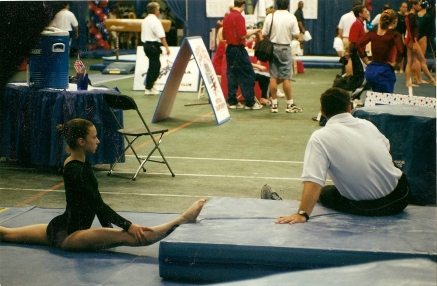 One thing that sets gymnastics apart is that it allows each person to perform skills that best suit them. I was able to compete skills that some of my teammates could never even attempt, but the same was true the other way. Once you have put together your skill sets (routines) it is all about consistency. And to be consistent you need repetition, repetition, repetition. Each training session starts with warming up your body and stretching. Some days we spent extra time focusing on the very basic and core gymnastics skills and drills. The basics are important because everything you do is built on and somehow uses those basic skills and positions. Your body has to know how to correctly feel and execute those basics every single time. After that, you head to one of the 4 events and begin to work either on individual skills or routines.
One thing that sets gymnastics apart is that it allows each person to perform skills that best suit them. I was able to compete skills that some of my teammates could never even attempt, but the same was true the other way. Once you have put together your skill sets (routines) it is all about consistency. And to be consistent you need repetition, repetition, repetition. Each training session starts with warming up your body and stretching. Some days we spent extra time focusing on the very basic and core gymnastics skills and drills. The basics are important because everything you do is built on and somehow uses those basic skills and positions. Your body has to know how to correctly feel and execute those basics every single time. After that, you head to one of the 4 events and begin to work either on individual skills or routines.  Sometimes you have to hit 10 in a row of every skill in your routine. Sometimes you spend time learning new skills or new combinations to increase your start value. On other days, you literally just do routine after routine after routine to build up your endurance, confidence, and perfection. Once you were done with your assignments on that event, you would move to another event. In our gym, we would usually spend the last 20-30 minutes doing strength and conditioning which consisted mostly of body weight exercises (arms, legs, stomach) and endurance (circuits, running, and the dreaded wind sprints).
Sometimes you have to hit 10 in a row of every skill in your routine. Sometimes you spend time learning new skills or new combinations to increase your start value. On other days, you literally just do routine after routine after routine to build up your endurance, confidence, and perfection. Once you were done with your assignments on that event, you would move to another event. In our gym, we would usually spend the last 20-30 minutes doing strength and conditioning which consisted mostly of body weight exercises (arms, legs, stomach) and endurance (circuits, running, and the dreaded wind sprints). - The Best of The Best
Every elite gymnast wants to be the best. Every elite gymnast puts in the time, the effort, the blood and tears, the sacrifice. Every elite gymnast has parents and family who see them only a little each day, who encourage them when they want to give up, who cry with them when they fail, and who rejoice when they succeed. There are more girls out there than what you see on TV. There are more who have given up everything to try to stand at the top of that podium (in 2009 there were 79 elite gymnasts in the woman’s program in the USA ). So what separates those who win from those who don’t? Well, partly talent. But there are really two major factors:
- How Well An Athletes Body Can Hold Up. This sport is so incredibly extreme.
Your body is pushed to limits that an average person cannot conceive.
It requires strength, flexibility, power, grace, air-sense, and so much more.
You can’t go too long in this sport without some sort of nagging injury or major set back. Joints, muscles, ligaments, bones, they all take a beating. While in general, the gymnastics world has gone to great lengths to make the sport as safe as possible, there is just no getting around injuries. The ones who get to the top have either the least amount of injuries or a rare body that heals quickly and completely. Every elite athlete is talented, and obviously some more so than others (*cough* Simone Biles *cough*). But one major test of who can go the farthest lies in who has a body that can withstand the test of time.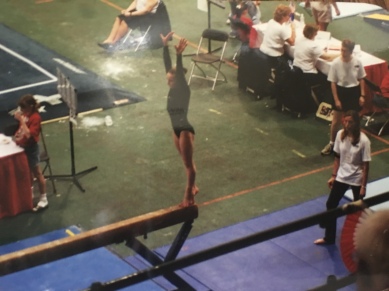
- Mental Strength. You know that old saying, “(Insert Sport) is 10% physical and
90% mental?” Well, it is pretty accurate. Once you get to a certain level in any sport, you start to understand the power of your own mind. I’m not just talking about knowing and understanding the techniques you are using or the order of skills in a routine. Your mind has the power to keep you on the balance beam or make you fall. It has the power to save you from an injury or cause one to happen. In order to be consistent and to be successful you have to be on the top of your mental game. You have to have confidence. Not the prideful confidence that says, “I’m awesome,” but the confidence that you can execute your routine and skills in front of crowds and judges in the same way that you do in the quiet comfort of your own gym. You have to be able to visualize your routines flawlessly in your mind over and over and over (this sounds simple, but it is really quite difficult and requires practice). You have to be able to block out all the music, the cheering, and the surrounding noises and listen to nothing but the sound of your own voice in your head, and maybe the sound of your coach as well. You have to be able to ignore the things that you know will cause you to lose focus and remain in a state of mind that will keep you on the top of your game. In the same way that you start to train physically at a young age, you also have to train mentally from a young age as well. You are taught how to visualize your sets perfectly. You are taught to give yourself keywords to say in your head throughout your routine that will help you to focus and execute your skills correctly. You learn what it is that helps you to stay strong mentally during a competition, and what things cause you to lose focus.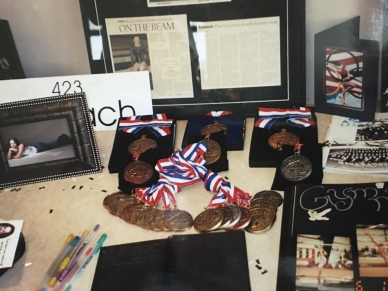 For some, they enjoy watching other athletes or listening to music as it takes their mind off of themselves and doesn’t allow them to get anxious. Others, like myself, have to stay in their own little worlds with their visualization and their keywords and not pay attention to what anyone else is doing. Everyone is different, but the main point is that in order to be successful, your mind has to be just as strong as (or maybe even stronger than) your physical body. It only takes one moment for someone to lose that mental strength and their whole career to snowball. They may have the body and the talent, but if fear or anxiety creeps in and takes over, they will not be successful.
For some, they enjoy watching other athletes or listening to music as it takes their mind off of themselves and doesn’t allow them to get anxious. Others, like myself, have to stay in their own little worlds with their visualization and their keywords and not pay attention to what anyone else is doing. Everyone is different, but the main point is that in order to be successful, your mind has to be just as strong as (or maybe even stronger than) your physical body. It only takes one moment for someone to lose that mental strength and their whole career to snowball. They may have the body and the talent, but if fear or anxiety creeps in and takes over, they will not be successful.
- How Well An Athletes Body Can Hold Up. This sport is so incredibly extreme.
- Do You Have A Life? This was a question I was often asked when I was an elite.
“Don’t you wish you had friends and could go out for ice cream and stuff?” Uh…I think you’ve misunderstood my life a little bit. Often times these athletes are portrayed as sheltered little girls who have no life, can’t eat junk food, and look about half their age. The truth is, we’ve traveled the country (or world) more than most kids have traveled their own state.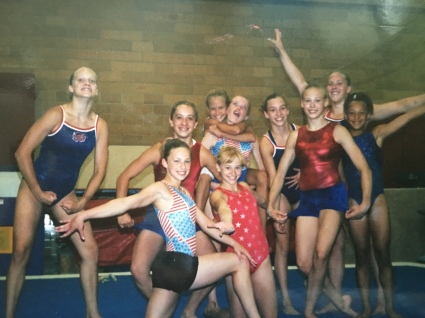 We have friends all over the country because of all the competitions, clinics, and training camps we’ve attended. Not to mention our teammates who have been there with us for hours a day. We do eat junk food, go out for ice cream, and sometimes even water ski! 😉 And yes, we do look young because we are young, and we’ve trained so intensely that usually our bodies don’t properly mature until a little later . This is the life these athletes have chosen. We CHOSE to spend our time in the gym because we love gymnastics. We CHOSE to not eat junk food all the time because our goal is more important to us than treats. These girls don’t really feel like they’ve missed out on anything in life. If anything, they probably feel like they’ve lived it more fully than their school peers (no offense).
We have friends all over the country because of all the competitions, clinics, and training camps we’ve attended. Not to mention our teammates who have been there with us for hours a day. We do eat junk food, go out for ice cream, and sometimes even water ski! 😉 And yes, we do look young because we are young, and we’ve trained so intensely that usually our bodies don’t properly mature until a little later . This is the life these athletes have chosen. We CHOSE to spend our time in the gym because we love gymnastics. We CHOSE to not eat junk food all the time because our goal is more important to us than treats. These girls don’t really feel like they’ve missed out on anything in life. If anything, they probably feel like they’ve lived it more fully than their school peers (no offense).
I’m a firm believer that you are only as good as the effort you are willing to make. If you ever go into a gym and watch a group of gymnasts closely, you will probably notice that the ones who are the best are the ones who take the most turns, do the most work, complete all their assigned conditioning and endurance work, and stay late to do a few extra things. Everybody has the opportunity to make themselves the best they can be. The ones who see success are the ones who actually put in the time and go the extra mile every day. Those are the elite gymnasts. I applaud these girls and I root for every single one of them. They are intensely devoted to their goals and, perhaps, one of the best examples that in order to be successful you have to work hard and make sacrifices. If you only see the sport every 4 years, you don’t realize that these athletes have put in thousands of hours of hyper-focused, difficult, exhaustive work when nobody was watching. Whether you’ve seen them on TV or not, they are out there. Their lives look different, but they wouldn’t have it any other way.
